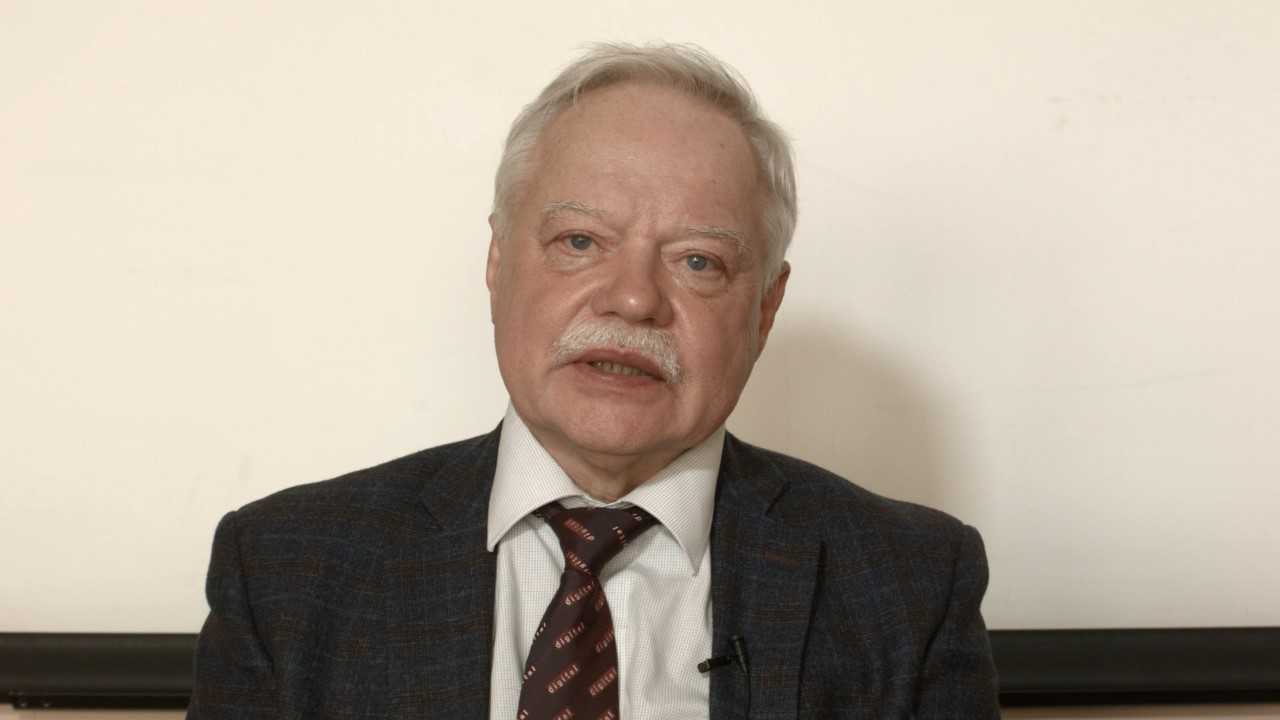
Vladimir Kitov has already talked about his work at the Main Computer Center of the USSR Ministry of Morphlot and the Central Research Institute "Monolith", a multi-terminal monitor for the ES computers , the history of the automated control system in the USSR, and meetings with prominent Soviet cybernetic scientists . In the final part of the interview to the DataArt museum project, Vladimir Anatolyevich recalls the IT of the 1990s and the post-Soviet period of his career: work in DEC, SIEMENS, Technoserv, IBS, Fujitsu, as well as his passion for history and theater, poems about cybernetics and friendship with Leonid Filatov.
DEC
At the very beginning of 1991, Digital Equipment Corporation (DEC), then the main competitor of IBM, decided to open a representative office in the USSR. In the Soviet Union, ES computers were analogous to IBM 360 and 370 computers, and SM computers were analogous to DEC computers. DEC made an excellent PDP 11/70 computer. In March 1991, I had five interviews and started working for them since April. By the way, he was the first Russian employed by the Moscow office. I do not exclude that this is largely due to the fact that he led the creation of OBI - a product that competed with IBM's CICS system.
They took me to work in the DEC office in Russia as the head of the IT projects department, but six months later they reoriented me to the position of the head of the Science and Education department. My first business card was DEC in the USSR.
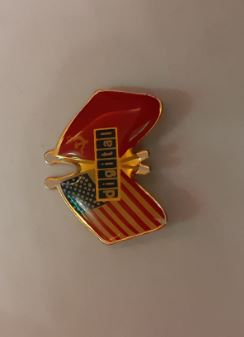
Badge issued by DEC in 1991
When I joined DEC, they had 118,000 employees in dozens of countries around the world. The most powerful corporation, but at some point its managers, as they say, fell asleep. First, in 1998, DEC was eaten by Compaq Computers Corporation, but it choked - in 2002, it was eaten by Hewlett-Packard.
But it will be eight years later, but for now I had a charming Italian as my boss, who actually led me remotely from Turin. I did not come to Moscow often, but always with a 1.5 liter bottle of grappa for me. We managed to create a good department by inviting Volodya Dyakonov, Igor Kalinchev, and other smart programmers. My department had very little work - there were no orders, since Russia is a country of qualified programmers who know their own worth, and at that time, according to the Soviet tradition, each organization was used to doing its own IT projects. There are no orders for projects, so there is no profit either. And under capitalism, such units are not needed.
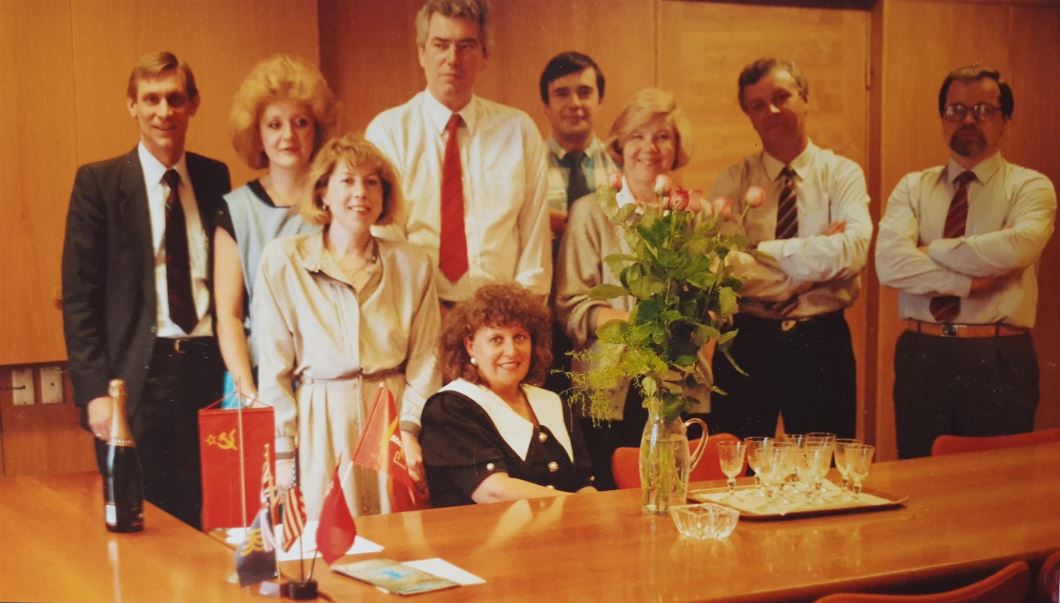
DEC «-» ( ) . : — DEC , — . — , DEC .
I am returning from a one and a half month internship at DEC - Great Britain, and my department no longer exists. The Italian chief was also fired, thus blocking my regular grappa flow, and the rest of the department employees too. And they said about me: "Let Vladimir stay at the firm for now, he may be useful to us." Formally, I was assigned to the DEC technical center, which was located in the technopark at VDNKh. For a couple of months I hung out practically idle. If you draw a football analogy, then in the DEC team I was what Fernando Torres later became at Atlético and Frank Lampard at Chelsea - an employee with no specific occupation. Occasionally he carried out one-time assignments: he went to a plant in Zelenograd to assess the feasibility of purchasing DEC for the production of computers;participated in negotiations with the management of the technopark regarding the expansion of the rented space for our technical center; organized a small exposition of DEC computers at the WTC, and so on. Basically, I spent whole days studying the technical documentation on the Dekov technique and improving my English. Then I learned it well, I even started thinking in English. Life forced, because all meetings are in the language, and if you do not understand what they are talking about, then you are to blame for the fact that the business is stalled. It means that they may soon be kicked out. And on the street there are no less than a dozen applicants who are just waiting for this to joyfully take your place.I even started thinking in English. Life forced, because all meetings are in the language, and if you do not understand what they are talking about, then you are to blame for the fact that the business is stalled. It means that they may soon be kicked out. And on the street there are no less than a dozen applicants who are just waiting for this to joyfully take your place.I even started thinking in English. Life forced, because all meetings are in the language, and if you do not understand what they are talking about, then you are to blame for the fact that the business is stalled. It means that they may soon be kicked out. And on the street there are no less than a dozen applicants who are just waiting for this to joyfully take your place.
After a couple of months, this uncertainty ended like this. The general director of the representative office, Mr. Peter Shiposh, summons me to his office. He introduces me to an American named Robert Jenewski and says that Bob is forming the European Science and Education team, and I am offered to lead this direction in Russia. Without thinking too long, I agreed, although many colleagues dissuaded me, rightly arguing that this is not only difficult, but frankly, and risky. But I, a former Soviet scientist, was just attracted by the fact that everything here depends only on you. It doesn't matter, for example, whether you are a member of the Communist Party of the Soviet Union or not. I worked well - well done, awards and bonuses for you, but bad - there is no one to blame, make room for another daredevil.

DEC . . . , . . , . . , . (), . . , . . , . . , ..
There were 5 main directions in the Moscow office of DEC. In addition to mine - "Science and Education" - there were also areas of oil and gas, industrial enterprises, transport and government agencies. Five Russian leaders of these areas then made an annual plan of several tens of millions of dollars. We knew our country, its procedures and developed our business well. And at first I thought that I could not work in the capitalist system. Before I was hired, I thought that under capitalism people work so hard that I just can't stand it. I decided to come back for a few months, take a look, try, and then let them kick out. In fact, he stayed at DEC for seven and a half years, and then for another fifteen years at other firms he choked out.
While working for DEC, I not only led Science and Education, but also represented the firm in the Russian branch of DECUS (Digital Equipment Computer Users' Society). In Russia, DECUS united several thousand programmers and electronics engineers who were literally in love with Dekov computers. I enjoyed communicating with these DEC enthusiasts immensely. I had a pleasant duty, having a certain amount of money, to really help DECUS members to hold annual conferences to share experiences. We met in Moscow, St. Petersburg and well-known science cities. One of the favorite places was the cozy scientific town of Protvino.
 Vladimir Kitov while working at DEC at the annual American computer exhibition "SUPERCOMPUTING-1995" in San Diego (USA)
Vladimir Kitov while working at DEC at the annual American computer exhibition "SUPERCOMPUTING-1995" in San Diego (USA)
I must also say that while working for DEC, I have always in my heart remained a patriot of Russian science, from which I came. Moreover, in the difficult 1990s, when there was no money for science in the country, and many of my fellow scientists (especially physicists and chemists) left for the West. Not for the sake of sausage, but because there were powerful servers for computing their scientific tasks. Therefore, I, as I could, justified before my bosses the need to help our scientific organizations. He argued that our assistance to fundamental Russian science is very important for strengthening the corporation's prestige in the world. I think my efforts were timely.
Suffice it to recall that the company donated powerful servers to the Faculty of Mechanics and Mathematics and the Chemistry Department of the Lomonosov Moscow State University, Bauman Moscow State Technical University, MEPhI, and also made the maximum possible discounts on supercomputers for IHEP (Protvino), IPCP (Chernogolovka), JINR (Dubna), IATE (Obninsk) and others. In Obninsk, the ceremonial launch of the Dekov Alpha Server was combined with the opening day of the monument to Frederic Joliot-Curie.
By the way, in 1991 during my internship at DEC-Great Britain in Southampton, my first acquaintance with the network happened. I was assigned a temporary workplace with a huge monitor. I turn it on and see the message: “Hello, Vladimir. Tomorrow after work in the dining room there will be a feast of Beaujolais. You are invited". I had to actively participate in the popular festival of young wine.

Vladimir Kitov while working at DEC
From Siemens to theater
In the second half of 1997, at the DEC headquarters near Boston, local guys informed me that the corporation was doing worse and worse. And just in 1998, my former director, Mr. Peter Shiposh, was invited to work at Siemens, one of the largest corporations in the world. Its large international division Siemens Nixdorf was engaged in the production and distribution of computers. The headquarters of this company was located in Munich, and Shiposha was appointed the general director of the representative office in Russia. He immediately called me: "Vladimir, I want you to work for me as the director of the partner network." So I became the owner of an excellent office, a member of the Board of Directors, and even a Kostenstelleleiter - one of the managers in charge of budget allocation.

Vladimir Kitov in front of the entrance to the Moscow office of Siemens Nixdorf on Presnensky Val Street
At the beginning, the situation at Siemens was very unusual for me. I was brought up on Soviet war films, and here around the German speech and a lot of Germans. Gradually, I began to forget English. It turned out that all here in the Moscow office are Germans from the GDR, many of them have Russian wives. They spoke excellent Russian, and many did not know English at all. People are not bad - no better and no worse than us. But the system works clearly, like a well-oiled mechanism, it goes on, a solid ordnung (order means). Over time, I have developed good working relationships with German colleagues, in particular with Messrs. Müller, Wolf, Bormann and Gütler.
Then I worked for Technoserv, one of the largest IT integrators in Russia. At the beginning, I was also invited to the position of director of partners. Moreover, Alexey Nikolaevich Ananiev personally said that he was ready to receive me according to a simplified scheme. But I replied that I want to be hired like everyone else - where else would I be asked about the details of my biography, connected to a lie detector? I could not miss such a unique opportunity.
Technoserv had a large partner network throughout the country, and I was responsible for it. Less than a year later, the chief appointed me one of his three deputies. At that time in Technoserv it was difficult to understand the management system at once. There were two general directors and as many as fourteen deputies. The position of the owner of the company, Aleksey Ananyev, was called the Chairman of the Board of Technoserv, and he already had two deputies: for technologies and for sales. I finished third in marketing. It was the pinnacle of my entire production career. Ananyev was an oligarch, he was on the Forbes-50 list of Russian billionaires. Almost every day he came to the office in his limousine (I do not exclude that it was an armored one), and the four of us regularly conferred in his office, solving current affairs.
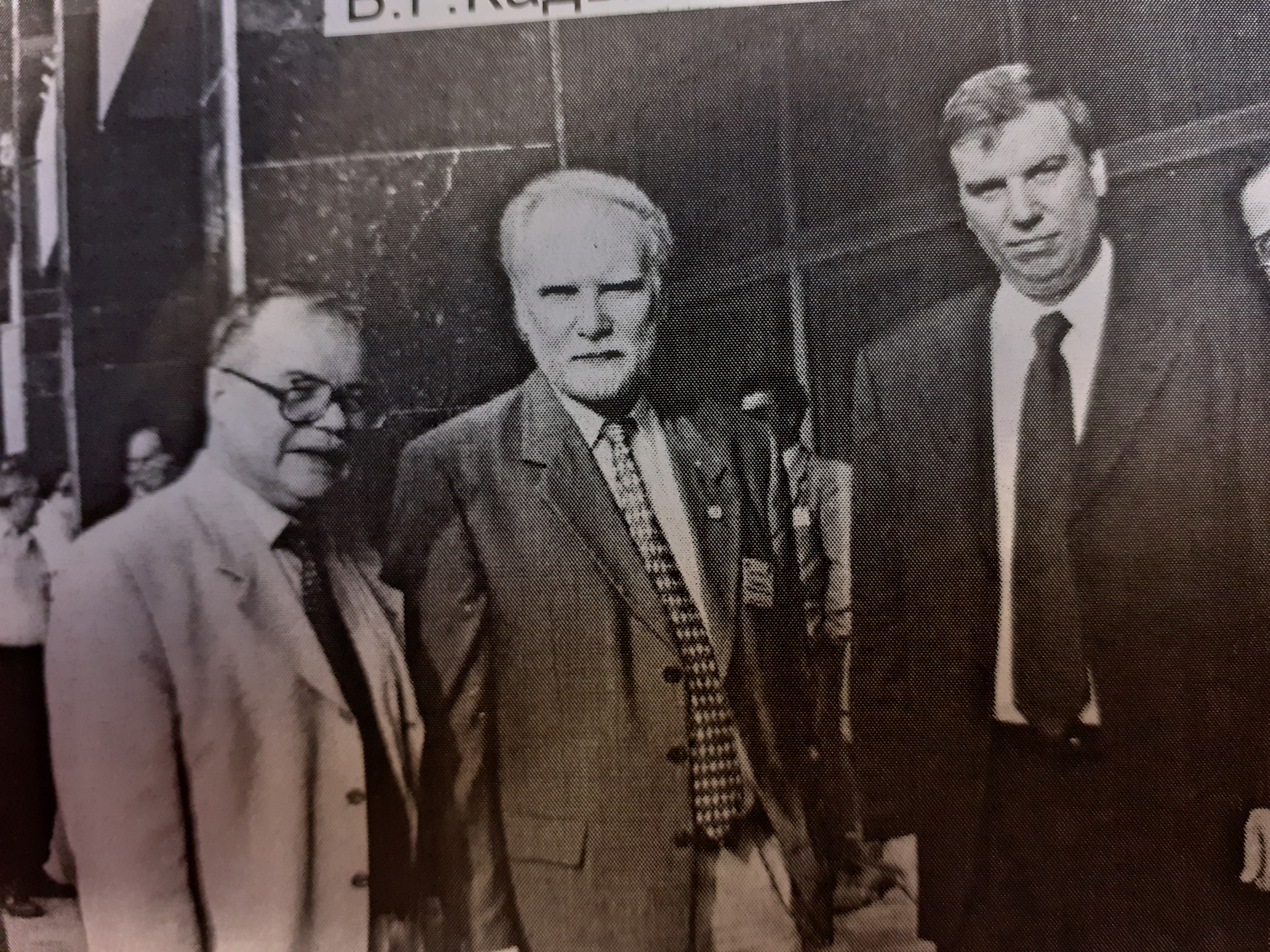
Joint Institute for Nuclear Research in Dubna. Vladimir Kitov, Academician Vladimir Kadyshevsky and Alexey Ananiev
I have the most favorable impression of Alexey Nikolaevich as a good family man, a businesslike and tactful person. At least in regard to myself, I do not recall any bossy rudeness or disdain. As far as I can judge from personal communication and acquaintances in the AP KIT club, many of the leaders of the Russian IT industry are smart, intelligent people. In particular, I can definitely call them Natalia Kasperskaya, Igor Ashmanov, Olga Dergunova, Vladimir Balasanyan, Boris Nuraliev, Tagir Yapparov, Igor Morozov, David Yan. And, of course, not only them.
I remember that one of my first things in Technoserv was the organization of the 10th anniversary of the company. IBM was celebrating its 90th anniversary, and Technoserv in Russia was their main partner at that time. Convincing all the bosses to celebrate together was easy. They took off the Moscow Government business center and hung on its facade a huge banner I invented "IBM and Technoserv - 100 years together."
Then I got into one of the largest Russian IT companies IBS - Information Business Systems. There I met two great specialists and wonderful people: Sergey Pavlov and Alexander Kotov. With them, we created the Innoway / Infosuite group of companies, which is still successfully engaged in IT projects.
At the conclusion of my business career, I worked for several years at Fujitsu-Siemens, an international company that emerged from the transformation of Siemens-Nixdorf. Then it became Fujitsu, since the Japanese bought out Siemens' share and became the sole owners, although they left all the computer factories in Germany. That is, they just changed the sign.
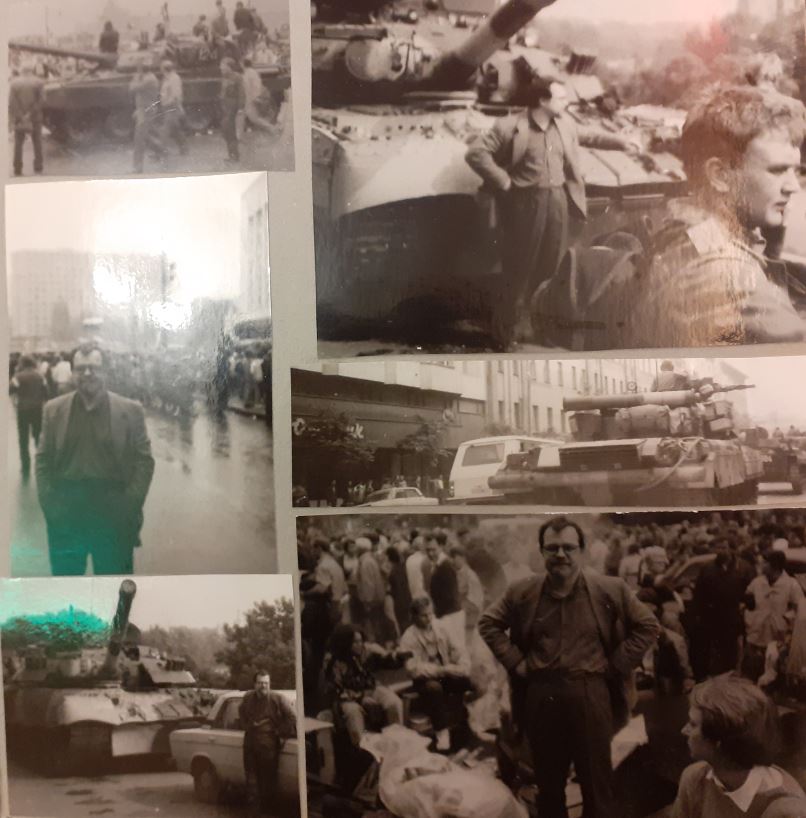
Vladmir Kitov near a friendly tank of General Lebed's division and on the barricades near the White House among opponents of the Emergency Committee in August 1991. Page from home photo album
During the capitalist period of my labor activity, I worked in three foreign companies: DEC (USA), Siemens (Germany), Fujitsu (Japan) and three Russian companies: Technoserv, IBS, Innoway. Having come to the American corporation DEC in April 1991, I was sure that I would be dismissed with a crash in six months, unable to withstand the high labor rhythm of capitalism. I just wanted to try it. It turned out that we also know how to work hard and proactively. For example, for three years I was awarded the DEC 100 champion bronze board as the winner of the capitalist competition, each time accompanied by a solid prize and a free trip with my family. By the way, no one else has been awarded three bronze plaques during the entire existence of the DEC representative office in Russia.Siemens Corporation awarded me a Swiss gold watch with a sapphire crystal for my efficient work. But I think the main result of capitalist activity is that I have acquired a large number of new wonderful and interesting friends with whom I continue to maintain relations to this day. Probably because for most of these twenty-odd years I have been in charge of Science and Education. That is, he talked a lot with scientists, teachers and writers, among whom there are a lot of interesting people, especially in Russia.because for most of those twenty plus years I have been in charge of Science and Education. That is, he talked a lot with scientists, teachers and writers, among whom there are a lot of interesting people, especially in Russia.because for most of those twenty plus years I have been in charge of Science and Education. That is, he talked a lot with scientists, teachers and writers, among whom there are a lot of interesting people, especially in Russia.
When I already worked at Fujitsu, my caring wife Olya repeatedly suggested that I quit. Because you come to work at nine in the morning and leave, as a rule, at nine in the evening. You have to do an annual business plan. Each fiscal year is a new battle. He promised his wife: “Okay, when I turn 60, I’ll retire.” But at the age of 60 he did not dare, because he understood that there was no way back. He left the company at 62, but quickly realized that living without work was boring. Then I decided that I would work, but not for the sake of money, but for the sake of interest and something new - for the soul. So I became the deputy director for business development of the musical theater "Impromptu" under the leadership of the wonderful actress Lyudmila Ivanova.
Theater Lyudmila Ivanova
Theater appeared in my life for a reason. My comrades and I have always been interested in literature and art. In his younger years, they regularly (three times a month) went to the theater, stormed the ticket offices of Taganka and Sovremennik. I remember spending the night in line at the Pushkin Museum of Fine Arts to see the Gioconda brought from the Louvre. He was friends with interesting good people.

Vladimir Kitov, Valery Milyaev, Lyudmila Ivanova, her friend and Olga Kitova - the wife of Vladimir Anatolyevich
The story of my appearance at the Impromptu Theater is as follows. I lived with my parents across from the Kremlin, in the so-called "House on the Embankment" or "Government House", described in the novel by Yuri Trifonov. The house had a museum, and I consider myself his friend. The director of the museum is the writer's widow Olga Romanovna Trifonova. Therefore, when the museum turned 20 years old, I took part in organizing the jubilee, was the host of the jubilee evening, which took place just at the Impromptu theater at Lyudmila Ivanova's. Lyudmila Ivanovna had a wonderful husband, a wonderful physicist Valery Alexandrovich Milyaev, a famous bard. He is the author of the popular song "The time
is coming ...", remember: The time comes, birds fly from the south,
Snowy mountains are melting, and there is no time for sleep.
The time comes, people lose their heads,
And this time is called spring.
We were immediately drawn to each other. We made friends with Valera and Mila. Then Lyudmila Ivanovna says: "Why don't you, with your experience in business, come to me as deputy director for development." I wondered. I especially liked to watch how the artists rehearse, how the performance is being created.
In parallel, I was invited to the Institute of the History of Natural Science and Technology - to head the direction of the history of informatics and computers. For several months I worked in two places, and then I realized that I had to choose something. The history of computers for me is my entire conscious life. Therefore, I left the theater, but we continued to be friends with Valera Milyaev and Lyudmila Ivanova.
"I tried to write poetry ..."
At the Institute of the History of Natural Science and Technology - the SI Vavilov Institute of History and Technology of the Russian Academy of Sciences - a lot of well-rounded people, poets and bards worked. For the 80th anniversary of the Institute, it was decided to publish a collection of poems by its employees. There is also mine, the story of which is written as follows. Once colleagues from the Polytechnic Museum, with whom we are very friendly, wrote to me about my co-author and friend Valery Vladimirovich Shilov: “We found out that he is a Poet and you tried to write poetry”.
Since Valera and I believe that we are both amateurs, I was offended that he was a “Poet”, and even with a capital letter, and I was just “trying”. Then he wrote the verse "Answer to colleagues from the Polytechnic Museum", which was published in the collection.
I tried to write poetry, I
reached out to culture,
But my ancestor was from a plow,
His century bent behind the plow.
Barefoot, downtrodden, serf,
Not attending school,
Clever, clever, mischievous,
Happy with the villagers.
I passed on my mind to descendants -
Long live genetics.
And in the USSR, not without difficulty,
Cybernetics was recognized!
Let me remind you that Anatoly Ivanovich Kitov is the author of the first positive article in the USSR on cybernetics.
Me and personal computers, as well as from memories
My acquaintance with the PC took place in the late 1980s. At work, and I already worked at the Institute of Cybernetics as the head of the computer networks laboratory, I was given a rather expensive Hungarian-made PC. In April 1991, I was hired by the Moscow office of Digital Equipment Corporation (DEC), and pretty soon I was given a PC, but a laptop, by today's standards, of course, antediluvian. Then in 1994, my son, who was in grade 5, made an agreement with me: “If I finish the school year with only A's, you will buy me a computer.” I had to buy him a PC, even though I was afraid that it would distract him from school lessons. But he never played computer games. He quickly learned to program in Pascal and he wrote a three-dimensional computer game - an analogue of the then popular shooter "Wolf".These three computers were the first PCs in my life.
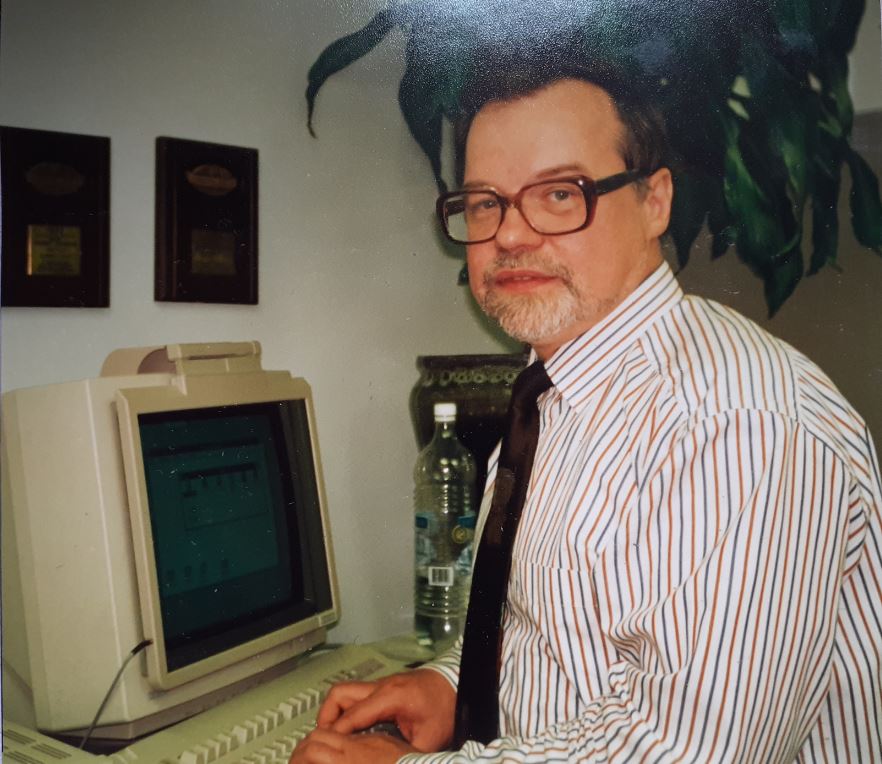
Vladimir Kitov while working at DEC
In general, I saw many computers of different generations: one of my childhood memories, of course, was the first Soviet serial tube computer "Strela", which I saw somewhere in 1956, when I drove with my dad to his work in Computing Center No. 1 of the USSR Ministry of Defense. Later, when I was already a student, computers began to look pretty mundane. In addition to our usual studies at the university, we also worked on the Dnepr-1 computer at the military department. Programs and data were then stored on punched cards. And then, one day, I had a big trouble - I stumbled, being late for class, and the deck of punched cards, which was in my hand, scattered. Then collecting them in the right order was not easy at all!
Now, perhaps the most surprising thing for me is modern mobile phones. I remember working on large computers, monsters, and here is a cool computer in your pocket.
What the future holds for us
Technology should drive many people out of their jobs. Computers accumulate a lot of information and will control many areas of human life. Some are afraid of the total surveillance and infiltration of privacy that will accompany this transformation. But it doesn't seem so scary to me, because I have nothing to hide. There are no special incomes, no crimes are registered with me. Let those who are interested know my home address and passport number, I'm not sorry.
Already now, with a computer in your pocket, you can imagine the future total computerization. But how could people have assumed this in the distant 1950s - given the dimensions of the computers, the unreliability of computing and communication technology ?! Although sometimes there were incidents. In particular, when Mstislav Vsevolodovich Keldysh was asked how many computers are needed to solve the country's problems, he replied: "Probably six or seven." The computer was then considered by many simply as a great adding machine. I counted the nuclear reaction, I counted the satellite's orbit - that's all. But there were also truly brilliant insights.
In the second half of the 1960s, dad was sent invitations to meetings of the Council on Cybernetics, organized by its chairman, Axel Ivanovich Berg, at the Moscow House of Scientists. I used to go to these meetings on these invitations. I remember once there the question "Can a computer think?" Was discussed. Berg believed that no, that she does everything according to the algorithm. A computer plays chess better than a person - it goes over it, counts very quickly. But man has other qualities. For example, intuition. One person then expressed the opinion that “A thinking computer is not difficult to create. It must be done in the same way as the human brain is arranged. " But the structure of the human brain remains one of the greatest mysteries of nature.
Friends and acquaintances
I am an ordinary person and I do not think that the mentioned moments of my life would be especially interesting to anyone, except myself and my relatives. But without this context, the story of the work would, it seems to me, not quite complete. That is, we programmed with great enthusiasm, but we never forgot about the general cultural development. First of all, we tried to keep track of all published book novelties: Yevtushenko and other people of the sixties, Solzhenitsyn, Bulgakov, Hemingway, Faulkner and others.
In my life I was unusually lucky to be friends with many talented and interesting people. Even before school he lived in the same house on Taganka and went to a walking group of seven children (like a modern kindergarten) with Irina Rodnina. As far as I remember, my dad had personal cars: "Pobeda", "Volga" with and without a deer, but the most superb was the captured German premium car Horch, which carried Bormann during the war. Huge, with shiny nickel rims, footpegs and two spare wheels on the sides. When dad came home for dinner, his driver drove all the kids in our house around the yard in this "Horch".
I studied at a simple school number 497 near a skyscraper on Kotelnicheskaya embankment. The director of our school liked to repeat: "Volodya Kitov is a real pioneer!" As the chairman of the council of the pioneer squad and the Komsomol secretary, I had a certain authority not so much with fellow practitioners as with their famous parents: violinist, People's Artist of the USSR Dmitry Tsyganov, writer Konstantin Paustovsky, composer Boris Mokrousov and others. During my school years, I sat at the same desk with the son of the people's artist, soloist of the Bolshoi Theater Vladimir Ivanovsky Serezha. This gave us an unlimited number of counter-marks in the Bolshoi. We could afford to come to "Prince Igor" to watch Polovtsian dances and then leave. The future movie star Natasha Gundareva studied with us until the 6th grade.Three visits to Galina Sergeevna Ulanova were unforgettable for me for the rest of my life - we agreed that she would visit our school.

, , 1974 . , , . ,
As a student, almost every summer I went to the sports camp of the Moscow Power Engineering Institute "Alushta", where in the evenings the rock group "Skomorokhi" headed by Alexander Gradsky played at dances. In the early 1980s, two years after the wedding, he lived on Pushkinskaya Square in the house where now McDonald's, and then there was a cafe "Lira". There we, as two motorists and the owner of a Zhiguli, met our neighbor on the entrance - People's Artist of the USSR Mikhail Ulyanov. He was an excellent conversationalist, and I also remember that one day he was driving in the elevator after working with him, and when he entered the apartment, he turned on the TV and saw Marshal Zhukov in his performance. We also once visited a glass container collection point at the Palashevsky market: I convinced Mikhail Aleksandrovich that it was not at all shameful to hand over the accumulated bottles. They took two full bags.
Fate brought me together with a kind-hearted man Sasha Sternin - a well-known master of photography in the country, then a photo artist at the Taganka Theater, now - the Lenkom Theater. Sasha made friends with the genius versatile person Leonid Filatov, friendship with whom lasted for many years until his death, and with Leni's wife Nina Filatova-Shatskaya continues to this day. Lenya, in addition to creative talents, also possessed the qualities of a true friend, human decency and extraordinary erudition. In the field of cinema and theater, this was an encyclopedia man. And the main value in life for him was Love, or rather love for his Nyusa and for books. Their relationship with his wife seemed to continue from the Taganka scene, where they played the roles of the Master and Margarita. By the way, thanks to the Filatovs, I watched this performance about twenty-five times.Nina's sacrifice and dedication during Lenin's illness evoke feelings of deep respect and admiration.
I wonder why a film about the great love of Leni and Nina will not be created against the background of modern serials of the same type. Lenya was also very fond of books, which, like many in the USSR, were in a terrible shortage and were distributed like high-quality products or one-piece hats. Naturally, Leni had a fan base of bookstore directors. He used to call: "Volodya, we are going to the bookstore on Sretenka for books," and we bought our products in full. When Lenya and Nina moved into a two-room apartment, as the highest recognition of friendship and trust, he invited me to take part in a sacred rite - arranging books in cupboards, taking into account eras, genres and authors. And, of course, Lenya is a poet. He began to write and publish when he was still at school, living in Ashgabat. Once he wrote:
In our writing country they
even write on the wall.
So I decided to
Be, of course, on a par with everyone !
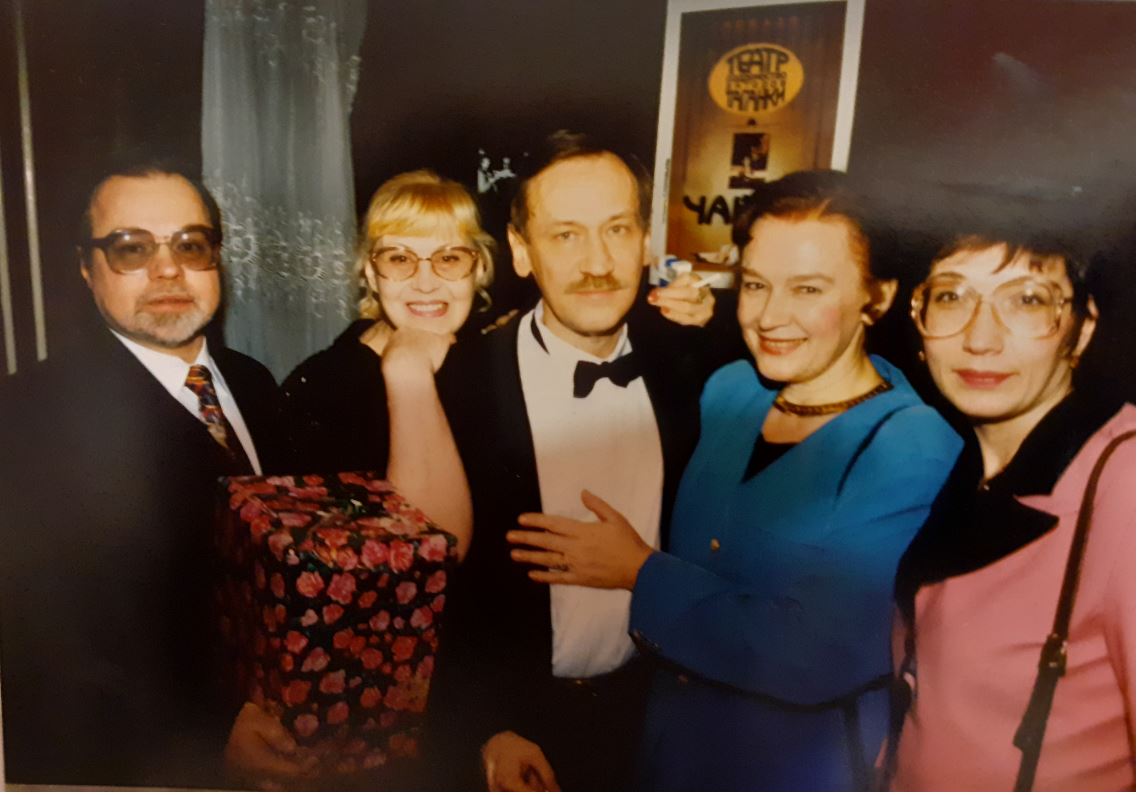
Vladimir Kitov, Nina and Leonid Filatovs, Galina Polyakova-Yurova, Olga Kitova
My wife Olya and, of course, Nina and I were lucky to be among the first listeners of many of his just written works. Including excerpts from the fairy tale "About Fedot the archer, a daring fellow."
***
Now I am happy to work at the Plekhanov Russian University of Economics as an associate professor of the Department of Informatics and a senior researcher at the Laboratory of Artificial Intelligence, Neurotechnology and Business Analytics, and also try to be a good grandfather of my three grandchildren: Katya, Tanya and Seryozha. I work at the department where my father worked for 17 years earlier, who also moved to Plekhanovka, becoming a pensioner. A decisive role in this transition was played by his friend since 1957 - Professor Konstantin Ivanovich Kurbakov - a remarkable scientist and person with whom I continue to regularly communicate. The Department of Informatics is headed by my wife, Doctor of Economics Olga Viktorovna Kitova, under whose leadership 48 employees work, the IBM Academic Competence Center functions. We have recently published the textbook "Digital Business"became the winner of the All-Russian competition "ACADEMUS" in the category "Economics and Management".
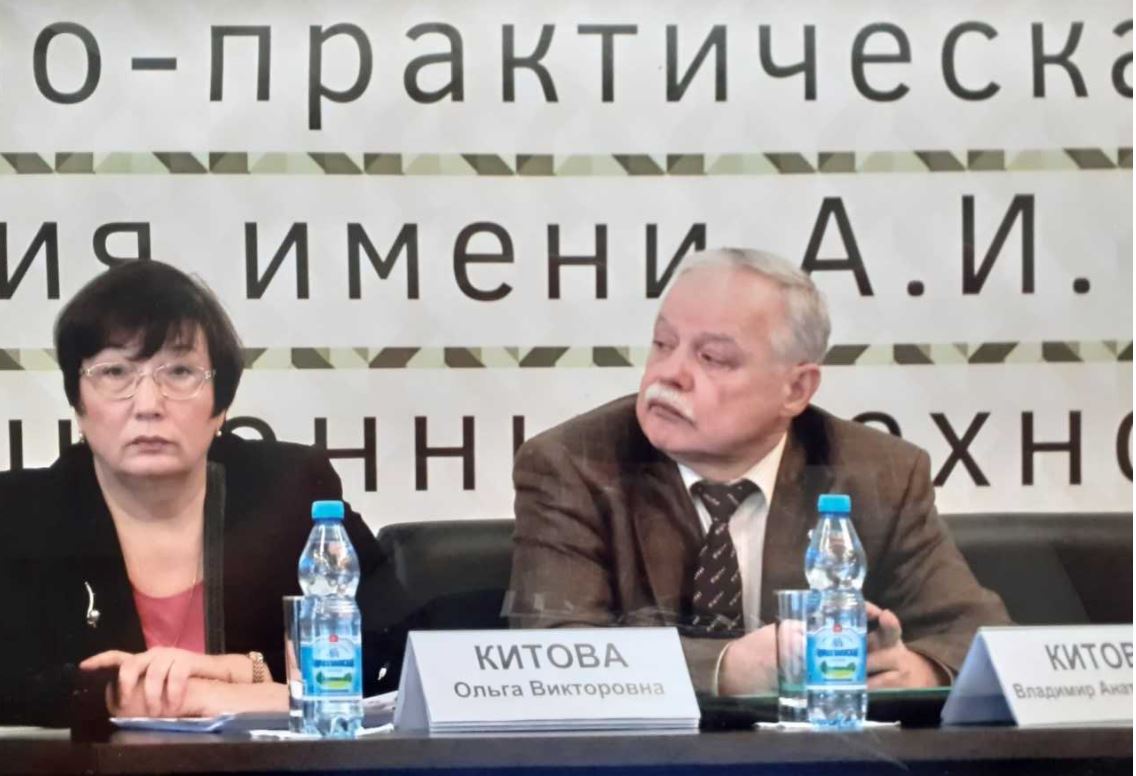
. . « », , 2019 .
The Plekhanov Russian University of Economics is a modern university included in the leading rankings of QS and THE, it has a rich history and a talented team, students from dozens of countries of the world study here. In recent years, the University has created the Institute of Digital Economy and Information Technologies, which unites departments and scientific laboratories, in which more than 2 thousand students study. The Plekhanov Russian University of Economics annually hosts the AI Kitov International Scientific and Practical Conference "Information Technologies and Mathematical Methods in Economics and Management", which I organize as deputy chairman of the organizing committee. Now we plan that on October 15-16, 2020 this conference will be held for the tenth time and will be dedicated to the centenary of my father Anatoly Kitov.